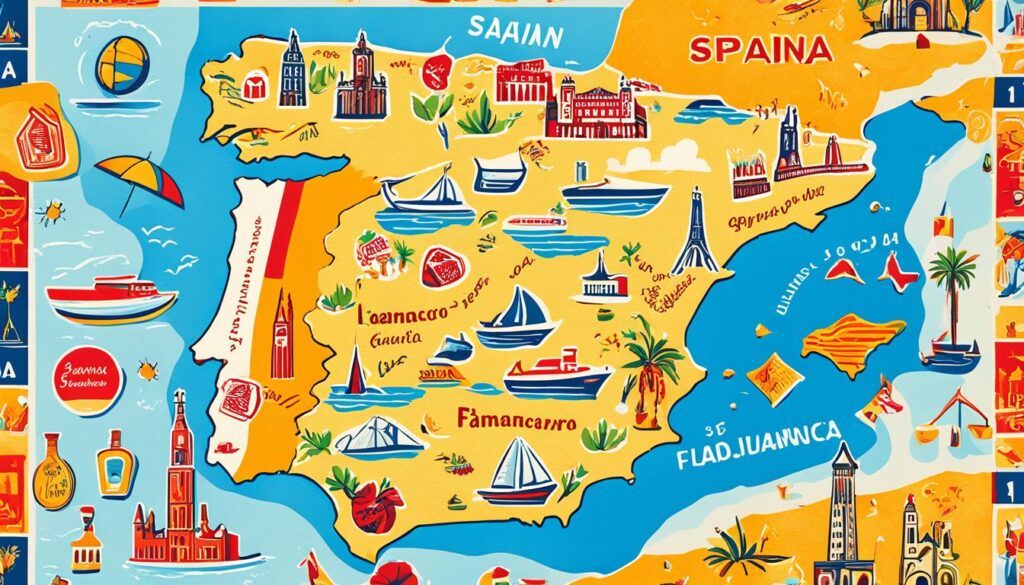Moving to Spain can be an exciting and fulfilling life change. As one of the most desirable destinations in Europe, Spain boasts a rich culture, beautiful landscapes, and a welcoming environment for expats. With over five million foreign-born people living in Spain, which represents more than 11% of the total population as of 2022, it’s clear that many are drawn to this vibrant country1. Whether you are looking to relocate to Spain for work, leisure, or permanent residency, understanding the initial steps and considerations involved in this journey will assist you in a smooth transition while avoiding common pitfalls.
This guide will reflect on practical steps involved in moving to Spain, covering everything from residency requirements to finding accommodation. Notably, it’s essential to be well-informed about the visa requirements and application processes needed to navigate Spanish immigration laws effectively.
In addition, knowing the local languages, such as Spanish, Catalan, Galician, or Basque, can facilitate integration into local communities and enhance your overall experience in this beautiful country2.
Key Takeaways
- Spain is experiencing a surge in foreign residents, particularly from the U.S.
- Understanding the visa application process is crucial for a successful move.
- Researching your future city can help in adjusting to the cost of living.
- Learning the local languages can ease your integration into Spanish life.
- Creating a budget is essential to navigate the housing market effectively.
Contact us if you are Interested in Buying Property Abroad!
Understanding the Appeal of Moving to Spain
The decision to relocate to Spain is motivated by various factors, making the country a popular destination for many. Those seeking new adventures may find the country’s excellent climate a major draw. Spain consistently ranks as one of the top countries for expats due to its numerous culture and lifestyle benefits that appeal to diverse individuals and families. Each year, thousands of foreigners choose to make Spain their home, enriching the vibrant expat community in Spain.
Reasons for Relocating
People often consider different reasons for relocating to Spain. The cost of living is typically lower than in other European countries and much more affordable compared to the United States3. Additionally, Spain boasts a high-quality healthcare system, with private health insurance costing between €50 to €200 per month3. These financial aspects allow expats to enjoy a comfortable lifestyle while engaging in the quaint local traditions and festivities that bring Spain’s culture to life.
Culture and Lifestyle Benefits
Spain’s rich cultural heritage offers a range of lifestyle benefits, including a relaxed work schedule with late lunches and long breaks4. Residents enjoy Mediterranean cuisine that is both affordable and of exceptional quality, appealing not only to locals but also to visitors4. The varied climate allows enjoyment of outdoor activities year-round, whether it’s basking in the sun at the beach or skiing in the mountains. Such diversity contributes to the overall appeal of living in Spain.
Expat Community and Support
The expat community in Spain is thriving, fostering connection and inclusivity among newcomers. Various local and online support networks help individuals integrate smoothly into Spanish culture. Events and gatherings provide opportunities for socializing and forging friendships, making the transition easier. Whether through social media platforms or face-to-face meetups, the support available for newcomers is one of the many reasons why relocating to Spain is a popular choice.
In summary, the appeal of moving to Spain encompasses a blend of economic advantages, an inviting climate, and robust community support, making it a destination worth considering34.
How to Move to Spain: Essential Steps for a Smooth Transition

Planning your relocation is a crucial step in the process of moving to Spain. Early preparation can set you on the right path and reduce the potential for stress during the transition. Establishing clear personal and professional goals will allow you to outline what you aim to achieve through this significant change.
Early Preparation and Planning
Defining your objectives will help refine your focus. Engaging with resources that provide insights into the Spain residency requirements is essential. Additionally, consider the unique experiences of others who have moved, such as the 72% of users who found enrolling in Spanish lessons beneficial for effective communication and cultural immersion before their move5.
Creating a Budget Based on Cost of Living
When developing your financial plan, it is vital to research the cost of living in Spain. Major cities like Barcelona and Madrid tend to have higher living expenses, including housing prices ranging from €3,700 to €4,500 per square meter6. In contrast, more affordable cities, such as Valencia at €2,100 per square meter and Alicante at €1,850, could offer more budget-friendly options. For an individual, a budget of €1,200 to €1,500 per month allows for groceries, dining out, and miscellaneous expenses6.
Researching Residency Requirements and Visa Processes
Understanding the Spain visa process is paramount for your transition. The necessity for a temporary residence permit applies to non-EU citizens wishing to stay in Spain beyond three months7. Be mindful that as of 2023, applicants must meet a minimum income requirement of €2,400 monthly to qualify for residency7. Researching opportunities available in Spain’s job market, particularly in technology, tourism, and agriculture, can assist in making your decision easier6.
Overall, a well-structured and thoughtful approach to early planning can significantly ease your transition into Spanish life, guiding you through the essential avenues such as securing private health insurance starting around €50 per month and learning about public healthcare options6.
Contact us if you are Interested in Buying Property Abroad!
Finding Accommodation in Spain

When exploring options for finding accommodation in Spain, it’s important to consider the choices of renting vs. buying property, alongside the distinct housing markets in various cities. Each option has its own benefits, and understanding them is crucial for anyone looking to settle in Spain.
Renting vs. Buying Property
Deciding between renting and buying property in Spain will largely depend on your financial situation and long-term living plans. Renting offers the flexibility to relocate without significant commitment, with rental contracts typically starting from a minimum of six months to several years, depending on the agreement8. Moreover, with security deposits usually equivalent to one or two months’ rent9, prospective tenants should ensure they are financially prepared. On the other hand, buying property could be advantageous for those looking for a long-term investment, especially in popular cities where property appreciation is common.
Popular Cities and Their Housing Markets
Cities such as Barcelona and Madrid are well-known for their high rental prices, often starting from €850 and €1,200 per month, respectively8. In contrast, areas like Ourense and Murcia offer more affordable options, with rents beginning at €375 and €5008. Understanding the local housing market in Spain will aid in making an informed decision regarding your living arrangements. Several platforms, such as Idealista, Fotocasa, and Pisos.com, provide extensive listings that include rental prices, property types, and locations suited to diverse preferences.
As you navigate the housing market in Spain, comprehending local laws and regulations is essential to avoid potential pitfalls within rental agreements10. In any case, whether you choose to rent or buy, ensuring you stay well-informed will elevate your experience in settling into your new Spanish home.
Understanding Spain Residency Requirements

Navigating Spain residency requirements is crucial for those considering a move. Understanding the various types of visas available is essential for both EU and non-EU citizens. Each visa comes with specific criteria and documentation that need to be meticulously addressed.
Types of Visas Available
The types of visas available for residency in Spain can vary significantly. Among the most common are the student, work, family reunification, and non-lucrative visas. For instance, EU citizens can apply for a permanent residence permit with just 6,000€ in a bank account and private medical insurance, which can be processed in as little as 24 hours11. Non-EU citizens face more complex requirements, including a minimum of 28,800€ in a bank account for a non-lucrative visa11.
Application Process and Documentation Needed
The Spain visa process necessitates careful preparation. Applicants must compile a set of documents, which usually includes a completed application form, valid passport, proof of funds, and health insurance. For a student visa, you must provide a recent bank statement showing a minimum balance of 10,000€, and this visa can be granted in approximately 20 days after submitting the application11. For short-stay visas such as a Schengen visa, a duration of 90 to 180 days is allowed but without the right to work11.
Importance of the NIE (Número de Identidad de Extranjero)
Acquiring the NIE number is vital for anyone wishing to obtain residency in Spain. This tax identification number is not only essential for residency purposes but is also necessary for opening bank accounts, signing property contracts, and engaging in various financial activities. Without the NIE number, navigating the bureaucracy of life in Spain can become particularly challenging.
Understanding the intricacies of the Spain residency requirements ensures a smoother transition for newcomers. Taking the time to familiarize oneself with the types of visas available and the Spain visa process can make a significant difference. For more detailed information on navigating these procedures, one can refer to Spain residency requirements1112.
Conclusion
Relocating to Spain can be an intricate yet rewarding journey when approached with the right mindset and preparation. Understanding how to move to Spain necessitates identifying your personal motivations, budgeting effectively for the transition, and engaging with the local culture. Many find that the average cost of living in major cities like Madrid and Barcelona is around 700 EUR before rent, while in more affordable cities, it can be as low as 600 EUR, making living in Spain financially accessible for many13.This account highlights valuable tips that can facilitate a smooth transition.
The vibrant culture, breathtaking landscapes, and welcoming expat community contribute significantly to the allure of Spanish life. Festivals such as Semana Santa and the Running of the Bulls reflect Spain’s rich traditions, while the country boasts a diverse job market, including key industries such as tourism and education13. As you embrace the sunny climate, especially in southern Spain with its over 300 days of sunshine a year14, the opportunities for both personal and professional growth become evident.
Ultimately, the journey of moving to Spain involves not only navigating residency requirements and housing options but also fully immersing yourself in the local lifestyle. With a thoughtful approach, you can make your new life in Spain not just a relocation, but a fulfilling adventure that opens doors to new experiences and lasting memories.
Contact us if you are Interested in Buying Property Abroad!
FAQ
What are the residency requirements for moving to Spain?
How do I navigate the Spain visa process?
What is the cost of living in Spain?
How can I find accommodation in Spain?
What support is available for expats in Spain?
How can I move my belongings to Spain?
Source Links
- https://preply.com/en/blog/how-to-move-to-spain/
- https://housinganywhere.com/Spain/moving-to-spain-checklist
- https://www.globalcitizensolutions.com/living-in-spain/
- https://www.immigrationspain.es/en/moving-to-spain/
- https://everythingisboffo.com/preparing-for-a-move-to-spain-essential-steps-for-a-smooth-transition/
- https://globalresidenceindex.com/living-in-spain/
- https://www.healthplanspain.com/blog/expat-tips/1880-how-to-immigrate-and-move-to-spain.html
- https://n26.com/en-eu/blog/renting-in-spain
- https://conversaspain.com/how-to-find-housing-in-spain/
- https://www.lexidy.com/blog/move-to-spain-while-renting-your-apartment-in-your-home-country/
- https://www.immigrationspain.es/en/visas-and-residence-permits-in-spain/
- https://www.globalcitizensolutions.com/americans-moving-to-spain/
- https://www.sanelo.com/guides/moving-to-spain/
- https://movetomalagaspain.com/blog/moving-to-spain-from-the-us/

Comments